If you listen closely, you can hear a frail ringing noise, like when the television would run out of programming late at night in the ‘80s. Only much softer. It keeps me up. At two in the morning the choral music starts again. My mother complained about it at lunch yesterday. She said, ‘the mosque is just too much.’ She said this in Bengali, “bodo barabari korey.” Her lips are thin and pursed as they are when she goes out to a meeting wearing dark red lipstick. She reminds me of a headmistress then.
~
One day, shortly after the Lockdown began, I heard her shout out with enthusiasm: one thousand cases!
My father has already acquired a good roster of jokes surrounding social distancing. What does a Punjabi call social distancing? Tan-doori.
I still don't understand it. There was another one which had the tag-line of Dan-singh.
~
I couldn’t get out of bed today, which is nothing new. I just couldn’t lift my neck from the pillow. I felt like I’d had a concussion. Electric sparks run up my spine. I can’t feel the tremors today. But when you are in the presence of others, you feel you must perform. So I do it, for the sake of my parents. Then perhaps every day has been a performance. For my sister who comes to visit with her two boys; for a phone call with my photo book editor in Georgia; For the dogwalker… I have become so reliant on these little happenings to pretend I feel okay that I have begun to dread the quiet days when I can no longer hide in lies and when it is perfectly alright for me to sleep in. I cannot stand those days. Soon, when all the world becomes a safer place, I will move to New York where there is no family and no help and then I will have to make up new lies every day as I go about chores.
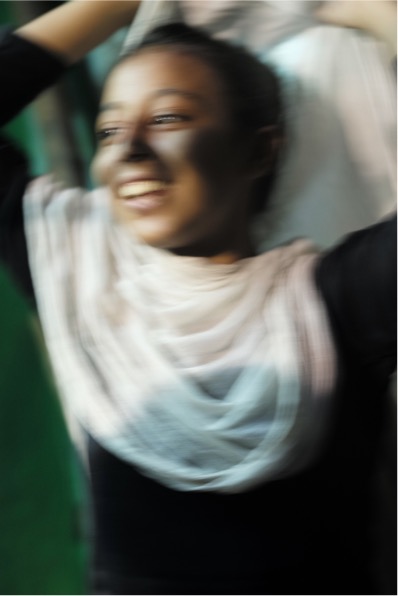
The mosque my mother speaks of is one of the several behind our house, where the Basti lies. Every few hours, the voices clamber over each other, a count down to my day. It’s where I had first met The Girls, and Mummyji. And the Mad Man, the Chaiwalla, Sharmila—the rest of them. It is impossible for me now, to listen to the Aajan and not think of them, although I haven’t visited in a year. Much of anything I’ve done over the past several years had its roots in the Basti.
Back in 2015, when I was at my worst, I had left my flat in Delhi, the lemon trees in the garden, and moved in with my parents in Ballygunge, a plush residential neighborhood of Calcutta. I had grown up in this house. I don’t remember the mosques from back then. I knew there was an area behind my house I was not supposed to go to, we didn’t even drive through them in cars, but that was where my curiosity ended. I knew it was a Basti, a slum, a settlement where the poor lived side by side in flimsy shacks, but I had no idea of who lived there, nor any interest in them as they had practically nothing to do with my daily life.
But in 2015, I was in my late 30s, I had just moved back to India after seventeen years in New York. I was writing fiction, or, was supposed to be, at any rate. When I started feeling better, I would go for short walks around my parents’ home and eventually found myself walking through the Basti. One left turn, a few hundred meters, and you were there already. No cars fit through the little alleyways even though the rumble of motorcycles often interrupted my meditations as I walked.
In the frustration of being an invalid and being so absorbed in being an invalid that I couldn’t even write, I would wake up every morning chanting, “I must create something. I must create something. Or else, I will die.”
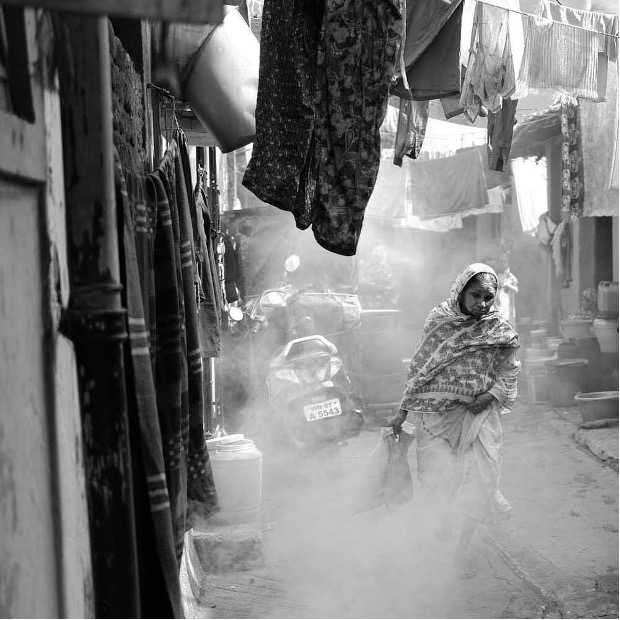
I started taking pictures of my walk on my cell phone— of the ruins of the bylanes, the broken shutters, narrow lanes glowing yellow under a single street lamp— all the stories I’ve never known.
Soon the locals would run over to me. ‘Didi, one photo please.’ I would acquiesce, even though I’d never seen them again. Their images would remain on my phone like stray photographs of a chance meeting you’ll never even remember again.
~
On one such morning, I happened upon a group of women doing their laundry. It was a Saturday. Not quite summer yet— the sun shone down and coated us with its warmth. I didn’t want to go home yet although if I walked farther into the maze of the Basti, I’d never find my way home again. But I needed to sit. The legs weren’t holding up so firmly as an hour before.
I asked the women if I could photograph them. They agreed and I spent much of that morning in their company, just clicking away without once looking up, as they hung wet clothes on the clothes line above looking over at me bemused.
‘E, kis liye’? One asked. What is this for?
‘Shouk,’ I replied. Meaning whim or fancy. I didn't know the Hindi word for hobby. ‘Just as one sings or paints? So does one take photographs,’ I explained.
‘Oh shouk ke liye,’ the woman tells the others, over her shoulders. They still look at me strangely but are satisfied with the answer.
~
Later on, I’d sometimes get asked point blank if I were from the Calcutta Municipal Corporation, documenting their filth.
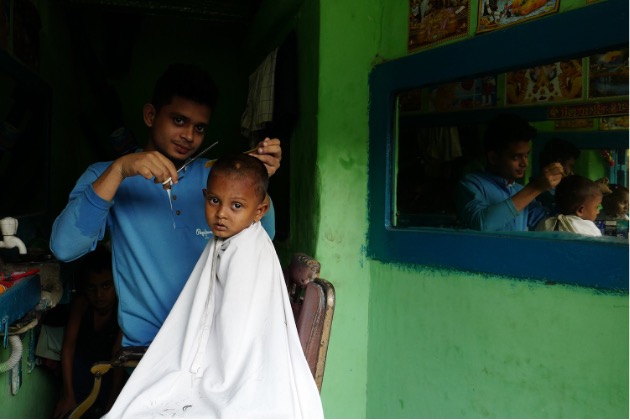
When I went back home and loaded the images on my laptop that afternoon, I was quite taken with the way the morning’s photo op had gone. I decided to make prints for the ladies and returned to the same washing area few days later. The women called each other out of their slumber from behind the curtains. ‘Ao, Ao, photo dekho.’ Come, come, see the photos.
They all had cell phones and they all knew what selfies meant, so to see a physical photograph was as much a novelty to them as it is to most of us these days. The photographs passed from hand to hand, woman to woman. They kept the ones of themselves and returned the ones I had taken elsewhere in my walk—of the butcher and the chaiwalla.
They asked me to return again that weekend when their relatives would be visiting and they would be cooking a feast.
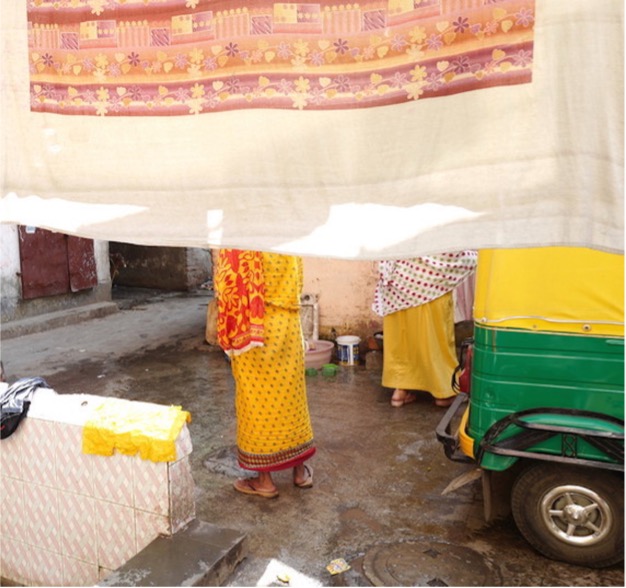
The younger ones posed for more portraits— in various computations of two’s and three’s. I went back as they had requested and took more pictures. Soon the shop owners near by would ask me to photograph their storefronts, proudly posing in front of their businesses; the boys playing football and cricket on the streets, the clubs which organized local functions for the residents. There was nowhere I could walk in the Basti without being called over.
I called those ladies, the ones whom I’d first photographed, my Saturday Morning Laundry Ladies. The boys and girls called me Photowali Didi. The sister with the photographs.
I visited the Basti almost weekly for close to two years. Then sporadically since.
I had a particular route I loved to take. Straight on from my parents’ home, past the school and the little narrow lane that opened out into another spray of multi-storied builddings and then to the square where the two cows were tied and where Sharmila, another friend I had made, lived. A few minutes with her and I would go to the chaiwalla — the tea-store owner’s— for a cup made the streetstyle way with spices and milk and sugar. There, I would meet, along the way, the Mad Man of the Basti who would use all the English words he knew in my presence. His favorite was in describing the rich people who lived over there—he’d point with his head to the large buildings in the horizon— “All college, no knowledge,” he’d say, referring to their children who’d return from America without a degree.
From the chaiwalla’s, I walked straight, crossing the main street and towards the area where the Laundry Ladies lived—my last and favorite stop of the evening.
~
The Girls are three sisters. Aliza, Nafisa and Simran. Two of them look identical, like twins. They don’t actually live in the Basti, as I found out much later but their aunt and cousin did and the first year, they were there almost every time I visited the Laundry Ladies, folded up on floors and beds of one of the small homes. Sometimes they’d be asleep when I arrived, holding their hands over their faces when they’d see me enter with the camera. “Abhi nahi, abhi nahi,” Not now, not now, they’d say.
~
On New Year's Eve of that first year, they shrieked and giggled when they saw me arrive. “Wait, wait,” they said as they threw back the curtains and hurriedly redid their hair, their lips. An old aunt sat on the bed, covering her face, not wanting to be a part of the stranger’s pictures.
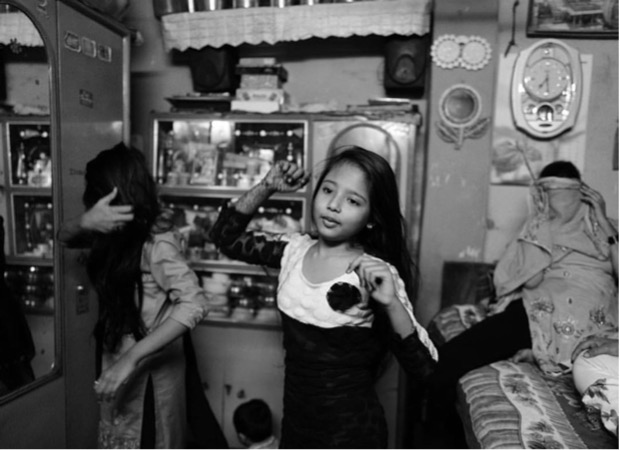
“Yeh kaun hai?” She asked and someone answered, “Wo eise photo khitchti hai.” She just takes photos for no reason.
“Kal photo le ayengi.” Tomorrow she’ll bring the photos back.
~
The Girls, the younger ones in general, didn’t really care much for the prints. They were in it just for the modeling. Much in the same way that those people, who lived one door down from Laila Bhabi, in the biggest house of the area with two fridges and even an air-conditioner, cared not so much about my photographs either but about the new clothes I promised to get the wife, who, I was informed was recently abandoned by her husband and left alone with a child to take care of. She was starting work at a beauty parlor and needed something to wear.
“Jeans,” she said although I didn’t have the heart to tell her it wouldn’t look so well on her maternal frame. I was thinking of something more loose and colorful. I actually spent a long time online choosing the right clothing and ordering it, only to find out the following week, from Laila Bhabi, that the woman’s husband was very much present in the house.
When I repeated what the wife and her mother had told me, Laila Bhabi’s tongue stuck out in horror. She shook her head. “Such lies, such lies” she said softly, in awe of their audacity.
Laila Bhabi lives with her daughter and granddson. She had recently kicked out her alcoholic son-in-law. Few days after, her daughter stopped being able to walk and talk and till today remains paralysed along her left side.
I didn’t give those next door neighbbors the clothes I’d bought for them— a leopard print top and a pair of cream pants— although I gave Laila Bhabi a big sack full of sarees and clothes for herself and her daugther.
The aunty who lives next to the parrot cage came running out too then went back in as soon as she realized they had been previously worn. “We don’t need such hand me downs,” she had said. Laila Bhabi took the sack with gratitude. She promised to wear one of them for me the next time I came.
When I was leaving, a hand came out of the parrot cage house and grabbed me. “I’ll wear them. Can you bring some more for me?” A voice said, through the curtain.
~
The thing is, my mother, who owns most of the closet space in this large house we live in, gives hand-me-downs to all her relatives— mostly gorgeous sarees she has never worn herself. But the pride of the poor sits high on their chest.
I’m still holding on to the leopard print top, waiting for its rightful owner one day.
~
The Girls have made me scurry around the Basti some bit themselves. The first time I met Mummyji, their mother, they were staying not where the Laundry Ladies did but with another relative few streets down.
It was late evening. I was at the main square, across which the small single room houses of the Laundry Ladies lay scattered. I was at their cousin’s home looking for them. Before I could utter a word to protest, young Simran had been sent over to escort me to where they were, two narrow roads down. In these few years I have met all their aunts and cousins, their neighbors and street dogs and they still don’t know my first name. The only thing they know is that I have a sister in Delhi.
I don’t tell them that I lived in New York once—yet another thing that stands between them and me.
~
I hobbled behind Simran and she’d stop once in a while, waiting for me to catch up. She didn’t say anything but sighed as she waited, patience spreading across her face like smooth, white cream.
~
“Yeh wo Didi hai,” they told Mummyji, who was sitting on top of the bed. Mummyji smiled. Lines spread across her cheeks and forehead like ruins. I couldn’t decipher her age and noted how sad and sickly she looked. I knew that look well.
It was, actually, just two weeks ago, while updating the fundraiser I am currently running for her, that I noticed her age on some documents I was sent. She is, as of writing this, thirty-four years old. Nine years younger to me although she looks more like a Mummyji than I ever will.
~
The Girls pulled out boxes of clothes from beneath the bed. Aliza, the smart one, noticed I was taking photographs while she was getting ready in front of the cupboard's mirror. She began to stick her tongue out in pose and I still don’t know what Tik Tok video they learned that from. The Girls teach me many things, one of the principal ones being that I am still alive.
When you see them dressed up, you won’t know they come from the Basti. They look like anyone else—smartly dressed in western wear. I’ve given them several of my old clothes that no longer fit me— when the aunties weren’t around they said, they could wear sleeveless tops and skirts that ended above their ankles.
~
I was saddened when I learned that Mummyji was better and that The Girls and she were moving back to their own house in Topsia.
“Waha auge, na?” They asked.
I gave them my word I would visit although I had no intentions of making regular pilgrimages all the way over to a neighborhood that would require taking transport.
But one day, feeling up to the challenge, on Aliza’s birthday, I found myself keeping my word. Simran gave me detailed instructions over the phone. I was to stand in front of the main mosque in Topsia from where she would fetch me and take me to their home, not too far away. I took a taxi.
Cars honked and motor cycles beeped up and down the main junction, where I stood, holding a box of cake clumsily in one hand, camera slung over my shoulders, trying to act as though everything in my gait and posture was normal. Even in Topsia they stared at me while driving by, although I always take pains to dress down and demurely when I’m around The Girls or anyone in the Basti. I looked around me, trying to find space to sit down on the roadside. But fortunately I spotted Simran from across the street.
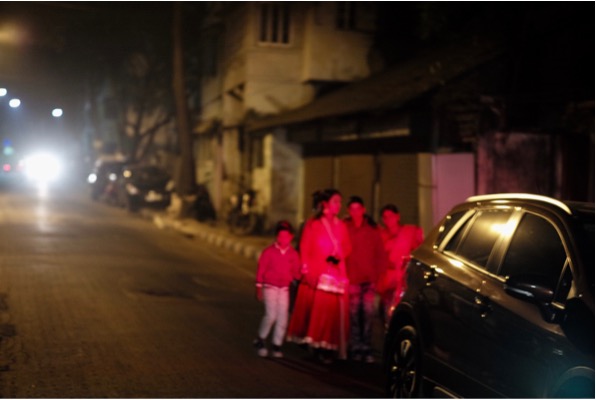
When we arrived near the house, she breaks the news to me that they live four floors up and my heart sank. I couldn’t do stairs then. I’d have toughened up one floor for them but four? I couldn’t do that, not for anyone.
We were standing in a damp, dark alley, with only a little light coming from a tailor’s shop nearby. She looked around helplessly.
I gave her the cake and told her to go upstairs and enjoy it. That I would wait down here till they were done and she could take me back to the mosque where I could find an auto or a taxi. I didn’t tell her that this was the first time I was leaving my house in a month.
~
My relationship with the people of the Basti and The Girls’ in particular still continues till today. They still don’t know my name nor that I come from one of the largest houses on May Fair Road, the landmark I always use when asked where I’m coming from. At first, some insisted I was sending these images back to America where they’d be published in the newspapers. Others would remind these gentle dreamers, ‘No, no, it’s shouk.’
It’s a relationship that was born out of an innocence and naiveness that has perhaps become my biggest boon in a photographic world abound with thoughtlessness.
~
I was not a photographer, or even close to using that word, when I had met the Basti dwellers. I was not photographing them with a project in mind and nor had I envisioned that three years later, these images would be displayed in New York and Art Basel. There were many more things, barriers, between us— the residents of the Basti and myself— than just street crossings and and the sort of clothes we wore. The camera added another layer to these.
It was only after Bill Boling, from Fall Line Press, discovered me on Instagram and years later, we started doing a book together, did I have to confront many of the problems and questions that circle around the issue of photographing poverty. It still puzzles me how much effort it takes for someone to just be human.
In recent months a famous image keeps coming to mind— you must all remember this—that of a man who had fallen onto the tracks of a New York subway. You can’t see his face in this famous image, recorded moments before his death, but I think you can see his hand—or perhaps my imagination is building up its own momentum now—and the steady, bright light of an oncoming train through the dark tunnel. There was an uproar when this image was published, I think by the New York Post. The station was empty. Or nearly so. Yet, this photographer had chosen, instead of helping the man get up to safety, to photograph him instead.
In recent months a famous image keeps coming to mind— you must all remember this—that of a man who had fallen onto the tracks of a New York subway. You can’t see his face in this famous image, recorded moments before his death, but I think you can see his hand—or perhaps my imagination is building up its own momentum now—and the steady, bright light of an oncoming train through the dark tunnel. There was an uproar when this image was published, I think by the New York Post. The station was empty. Or nearly so. Yet, this photographer had chosen, instead of helping the man get up to safety, to photograph him instead.
~
Over and over I have asked myself this— when The Girls’ call me to their home and I jump up readily, camera loaded and slung on shoulder; when I take sweets for the chaiwalla during Diwali —camera slung on my shoulder; when I send messages to The Girls’ on WhatsApp and avoid their persistent calls (I hate talking on the phone) and make plans to take them to the plushest shopping mall, not too far from the Basti; when I visit Sharmila and photograph her laments of her alcoholic husband; her daughter who had been murdered by the in-laws; when I photograph the shop owner hugging his favorite item in his shop— a non-working blender— who am I? What is my agenda?
~
I did have one, at first, although it sounds rather simplistic now. I wanted to take their photographs because I was trying to recreate a story and that made me happy. I liked to give them prints because it made them happy which in turn made me happier. Because even charity is an act of self-centeredness. But I truly enjoyed the challenges of walking around the narrow bylanes, looking for that one subject of a photograph, whom I had met only the day prior. I could never find my way around those labyrinthian lanes. I would ask the locals sitting around. A boy Photowali Didi might leap up in delight and race around the lanes within lanes, with me following awkwardly behind. He hadn't realized I couldn’t walk properly . I liked being recognized, I liked being called Photowali Didi. I liked the comments I got on social media.
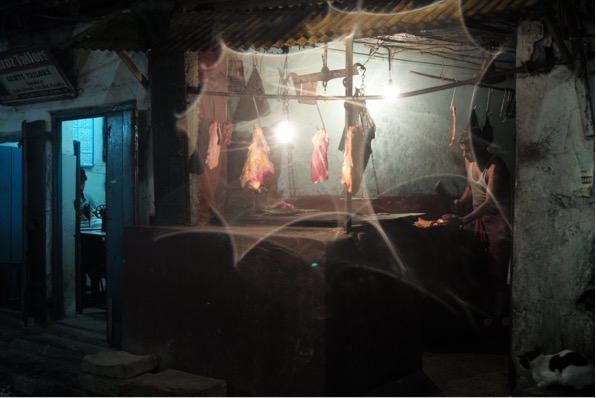
I had little guilt in what I was doing at first. The guilt only creeps in afterwards when too much theory infiltrates judgement and instinct. but it is clearer now than back when I had started— I was not photographing poverty. I was not interested in their religion. I was recording my new life in Calcutta, this time under my own terms. I was rediscovering a city I had grown up in but left for seventeen years. The Basti dwellers were my neighbors. Every evening I had tea and small conversations with them. This was no different than being in New York and heading straight to my local dry cleaner’s, where Jessie would tell me all the local neighborhood gossip. All this detracted from the real issue on hand— why can’t I walk? Who would I wake up as tomorrow?
~ ~ ~
On the first day of the Lockdown, I called the dog walker when I woke up. Had he come that morning as of yet? This is the first thing I think about when I wake up. Knowing the dog has been taken out allows me to release the longest strand of breath I hold in, all night through. If he doesn’t come, then, for a few minutes I try to champion myself out of bed: I think about which is my left side, which is my right, will I even be able get up and stand, how do I hold my balance today? And turn the narrow corners that lead out of the bedroom. Will everything go dark and I fall? And when all that passes and getting up still fails, I tell myself it is okay if he relieves himself in the balcony or by my desk, which is next to the balcony door.
The dog walker said he had, very early. He said it had been getting harder and harder for him to come on his bike. The cops were giving him a hard time.
I had been dreading and yet in a way also waiting for this moment to come. The last few days I could sense my energy waning. I could sense something coming quietly yet stealthily like a far away storm that you can feel by a drop in temperature— I was afraid I needed a period of bed rest again. Worrying about the dog was beginning to feel like a behemoth of a task. I sent a message to my parents: Julius will have to stay at your house for a while. And then, something slipped out of my fingers that I didn’t realize I’d been holding in along with my breath. I wrote, Maybe I should too. I sometimes say that it’s my fingers on the keyboard that do the thinking. They know, before I do, what I really knew all along.
~
At my parents’, The Girls’ began calling me incessantly and finally, out of guilt, I returned their call. Mummyji hadn’t been able to take all her chemo pills or go to the doctor. They had finished all the money I had raised for her treatment last year. Their father, an auto driver, hadn’t worked throughout the Lockdown. Mummyji was in such poor condition, she could no longer talk or recognize her own family.
The dog walker said he had, very early. He said it had been getting harder and harder for him to come on his bike. The cops were giving him a hard time. I had been dreading and yet in a way also waiting for this moment to come. The last few days I could sense my energy waning. I could sense something coming quietly yet stealthily like a far away storm that you can feel by a drop in temperature— I was afraid I needed a period of bed rest again. Worrying about the dog was beginning to feel like a behemoth of a task. I sent a message to my parents: Julius will have to stay at your house for a while. And then, something slipped out of my fingers that I didn’t realize I’d been holding in along with my breath. I wrote, Maybe I should too. I sometimes say that it’s my fingers on the keyboard that do the thinking. They know, before I do, what I really knew all along. At my parents’, The Girls’ began calling me incessantly and finally, out of guilt, I returned their call. Mummyji hadn’t been able to take all her chemo pills or go to the doctor. They had finished all the money I had raised for her treatment last year. Their father, an auto driver, hadn’t worked throughout the Lockdown. Mummyji was in such poor condition, she could no longer talk or recognize her own family.
~
I found an organization, Future Hope, that works with women and children. The founder/CEO, Sujata, sent someone over to The Girls’ home the same day as we spoke. This person took Mummyji for a brain MRI although she was so terrified by the machine, she broke the belt and had to be removed from the tunnel.
~
The Girls’ have been messaging me almost daily since then.
‘Do not forget Sujata Didi,’ I said sternly.
‘Nahi. Kaise bhulooon?’ No, how can I forget?, she replied. Sometimes I don’t even know which sister I am talking to. They share that one cell phone.
~
Simran begs me to visit them but I remind them that the virus is still around. It’s the last thing they need at this crucial stage of their mother’s illness. I am relieved I can use the Lockdown as my shield. In all these years, it has been hard to explain to The Girls’ that when I am not visiting them, it is mostly because I am too busy being dizzy and faint. That I can’t walk without feeling like I will fall over and my world will go black. Who can blame them for not understanding? No one I know does. Not even the doctors.
But I ask her for pictures and she sends me some. The sisters are wearing shiny gold salwar suits and lots of make up. It even looks as though there is glitter on their faces.
~
Off late, I have to keep repeating to myself: you are not in New York, you are not playing tennis. You are here. My mother has used the word ‘othorbo’ which, in English means ‘cripple’. She calls the choppy way I walk the ‘Geisha walk’. All this would’ve been amusing had it not really been happening in slow motion over the years, this turning into a vegetable in front of your own eyes.
I have, over the years, lost confidence in myself altogether. I feed off the championing positivism that comes out of my mother’s mouth. Not only because she nursed me back to health, but also because she has a way of living in a plain world where everything has answers and solutions and everything makes sense. Because somewhere out there, is the next morning, when I will once again wake up and realize I am not myself yet and may never be. Till then, I keep pretending in my mother’s world.
~
I ask Sujata, from Future Hope, if she can send me a video of the family for the fundraiser page. She sends one immediately. In the video, you can see the whole family— Pappaji, Simran and Nafisa on the floor. Aliza on the bed next to her mother. A man’s voice can be heard, talking in English, introducing each family member. The Girls’ are not smiling. Not really. Pappaji faces the camera directly. Father. So much burden in a name, I can’t help thinking. I always connoted it with one who provides— not just food but stability. How could the girls call him that? When their lives had been nothing but a series of let downs?
~
On the bed, Mummyji, wearing a bright pink kameez and yellow salwar sleeps with her head next to Aliza. Her hair is cut short and she looks far too young to be a mother of three teenaged daughters. She is turned towards the wall although you can sense her eyes are open. One leg folded. The other one lifts off the bed for a second. I can’t help thinking that it’s a yoga pose I cannot manage, even now. I have spent much of this Lockdown sitting or lying down on the bed. It is the only thing I wish to see at the end of the day and the one thing I hate seeing the most.
~
Outside, the last Aajan of the day just got called. That means it must be close to dinner time. I look at the dark, polish of the antique headstand of the bed I am lying on as I write this. The carved wreath like Ceasar’s crown in its center. This was my sister’s bed when we were growing up. When you are in mourning, these little details fill the various compartments of time.
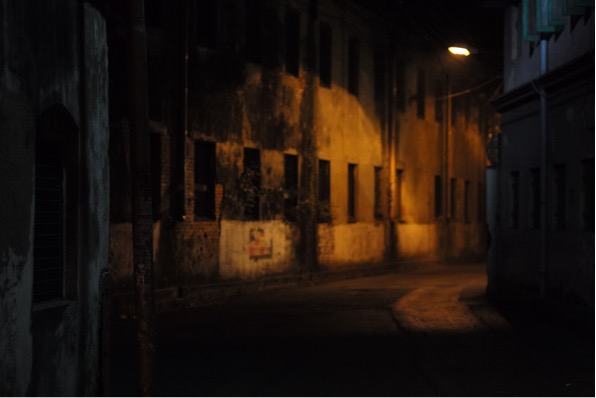
Everything I own is outside and in plain view in the room I am in. I have previously lived like this, in my childhood home, for months. Always with the expectation that this was a halfway house which I would soon leave.
I realize now that I had packed in a hurry and in panic— the only mode of operation I seem to be capable of these days. A backpack full of a few clothes and another bag with all my homeopathy medicines. The Prince, that is my dog, Julius, would have adequate food at my parents home. I wasn’t worried. I could’ve used some more underwear. A few more tops. But at the time, I had thought it would only be for a few days. I wish I could tell The Girls what I always tell myself: that the worst will only last a few days. Then things are bound to get better. Then, as always, this too shall pass. I have been telling myself this for the past six years.
Reading note:
Annie, Annie, Annie. I had been telling everyone I knew about a French writer I had recently discovered. I had done so by buying all the books Fitcarraldo Press had recently published. I loved their covers.
The book on her abortion (I am terrible with titles) was the first one I had read. She took my breath away.
This was just around the time of the first lockdown and I was in India.
I couldn't help feeling some personal accomplishment when she won the Nobel.
I am teaching two courses inspired by her work and based on her readings which is exhilarating simply to think about.
If you're curious about my classes, you can read about them at bukusarkar.com/workshops where you will find more of my work on Photowali Didi, my first monograph which, will be released later this year by Fall Line Press.
